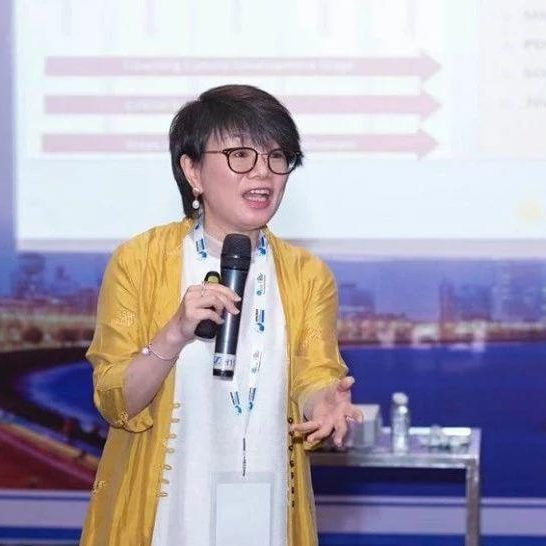Introduction:
Thank you for the invitation from APAC so I can have the chance to share my 24 years of coaching experience in China and how coaching help organizations in China to cope with the challenges of the changing market environment in China.
This is the rundown of the coming one hour, 45 minutes is my sharing, followed by 15 minutes of Questions and Answers. We will have two exercise together and I hope you can actively participate and learn more about coaching in China.
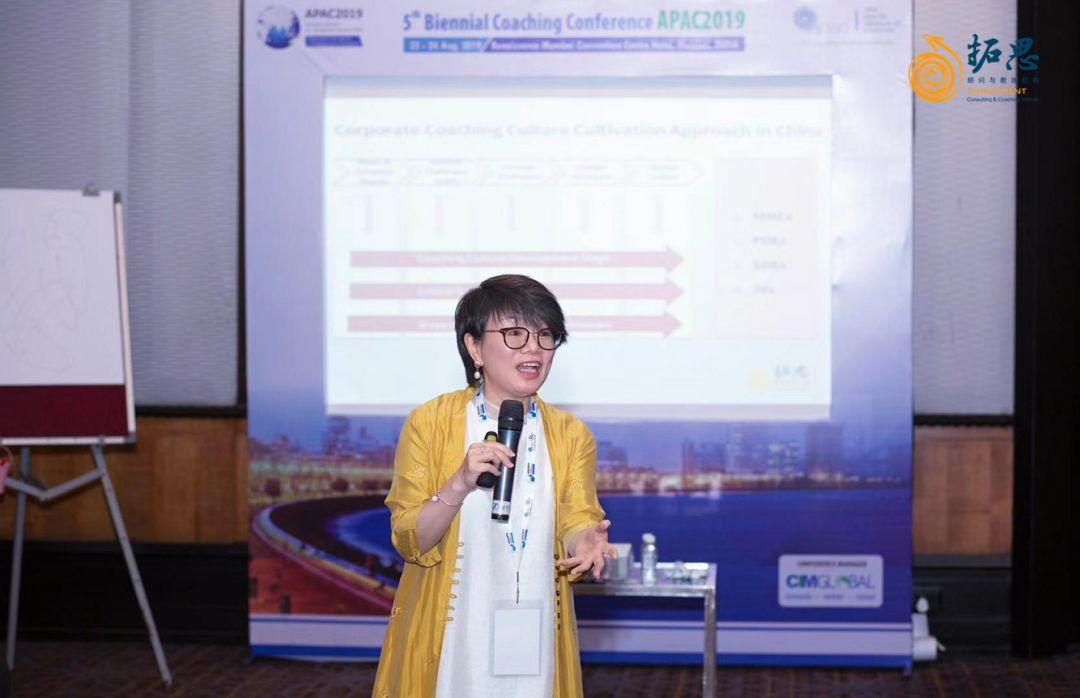
I came across Coaching in HK in 1995 after completing my MBA. Since then, I have been devoting myself to the coaching industry, the helping business, helping people to elevate their self-awareness and self-management. I have worked in Mainland China’s coaching industry since 1997.
I have designed two coaching programs, the first is PCP, Professional Coach Program with my company, Enrichment, getting the ACTP of ICF, and the second is CCLD, Corporate Coach and Leadership Development, a post graduate diploma program at the University of Hong Kong SPACE. These two programs are now being delivered in four main cities in Mainland China, Beijing, Shanghai, Chengdu, Shenzhen. My company also has two additional programs to bring up my graduates of PCP, one is CCCP, Certified Corporate Coach Program, and one is TCTP, Train the Coaching Trainer Program. I together with my trained coaches and trainers actively support the organizational development and employee development of organisations in China. In addition, I also founded Love Believe and Coach Link, two charitable and non-profit platforms in promoting life education and coaching.
Our coaches, Frances, Rita, Agnus, Helen, Sam, Wenji and I will answer any questions about my presentation and the China market in the Q&A session later.
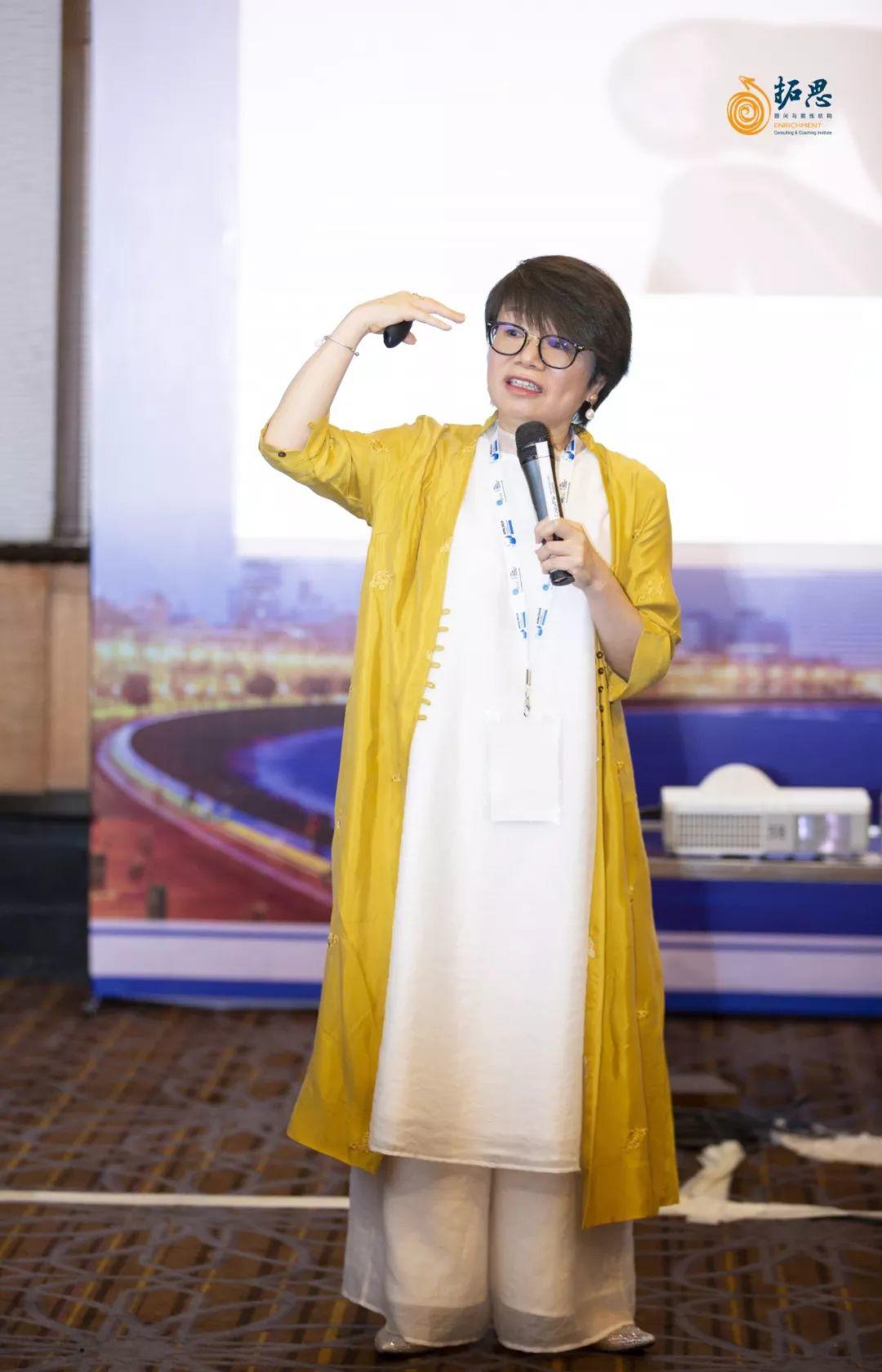
I want to do a small survey here first. Who are serving the China market as coaches already? Who wants to step into the China market as Coaches? Who want to know more about the China market as leaders? Great, What is the goal you want to achieve in this session?
I hope my sharing can help all of u to understand the China market better and meet your expectations most. For those who are already serving this market, I welcome your inputs and experience to my topic in Q&A later.
When I heard that the 2019 APAC conference would be in India, I immediately thought the coaching market in India is probably doing better than in China. Previously, India and China were close competitors in Asia in economic development as both of countries would use their low labour cost and low fixed cost to attract foreign investment.
I would like to use the five year data from 2015-2019 from ICF to understand the development of the coaching industry of India and China. From the data, we can find that whether in China or in India, the trend is gradually growing in terms of the number of ICF membership and accredited coaches. The number of MCCs in India is already 39 but in China, up till now, only 15. However, I come to India this time hoping to understand the growth drivers of the coaching industry of India. At the same time, I requested to be a speaker again in APAC conference to share the current needs of coaching in the organizations in China.
Exercise 1:
Before I start the key content of my presentation, one question I want to ask: How do you think about China? We have here our original developed coaching wisdom cards for you. They are created by our coaches. Please come to pick up two cards per person, one representing your own country and one representing how you think about China. Then, please share with as many as people in the room as you can why you choose those two cards. We have 5 minutes for this exercise.
5 minutes later, Stop now. Who would like to share the pictures on the cards you have chosen? You can turn to the other side of the card where there is a saying or motto. Do you think the motto fit how you think about your country and about China? (Max 3 persons to share)
China and India, two of the most ancient civilizations in the world, both have their own rich, deep culture,In China, we have the rich tradition of Confucianism in its 2500 years history. From Hofstede’s cultural dimension model, based on the research of Michael Minkov in 2012, India and China have similar scores in those six dimensions. The biggest difference is in individualism, where India scored 48 while China 20. It reflects Chinese people are more collectivistic than individualistic. In comparison with USA, the differences are quite dramatic except for one dimension, masculinity, where China scored 66 compared with USA’s 62. Although both countries have high drive for the success, power and competition, the reason behind such behaviours is different – USA is from individualism, in showing their own uniqueness, while China is from collectivism, in supporting the family.
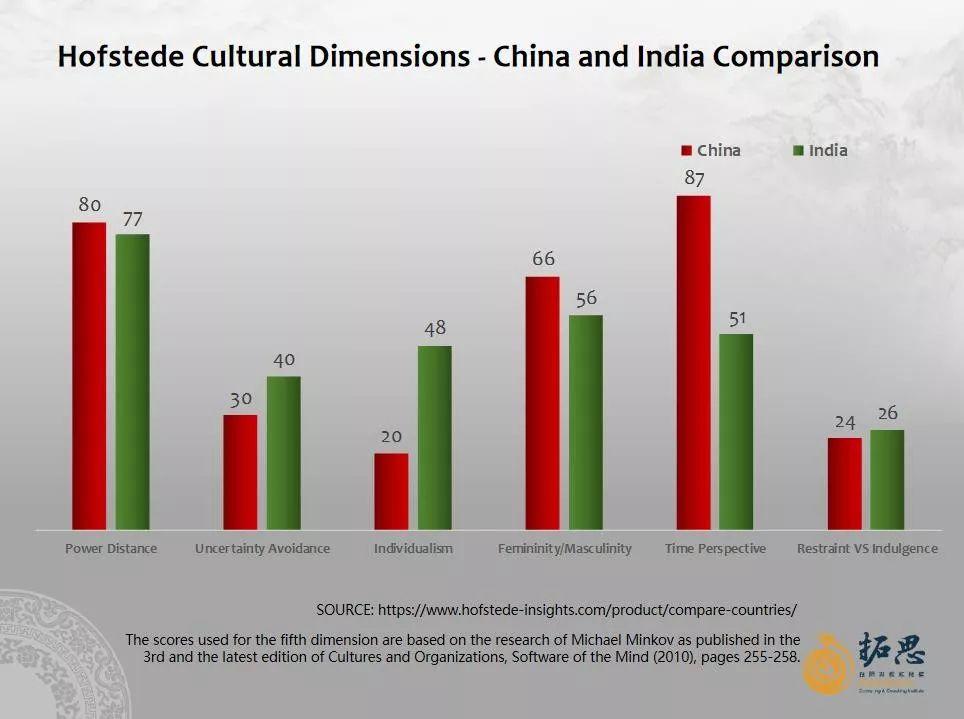
However, based on my observation and interaction with the people in Mainland China, the traditional cultural dimensions of China have been highly disrupted due to the rapid changes in the four external environmental situations. The economic and social context in Mainland China shifts the young generation of Chinese to chase for equality, individualism, low acceptance of uncertainty, short-term basis and higher indulgence. It seems the new generation of Chinese has become more American-like.
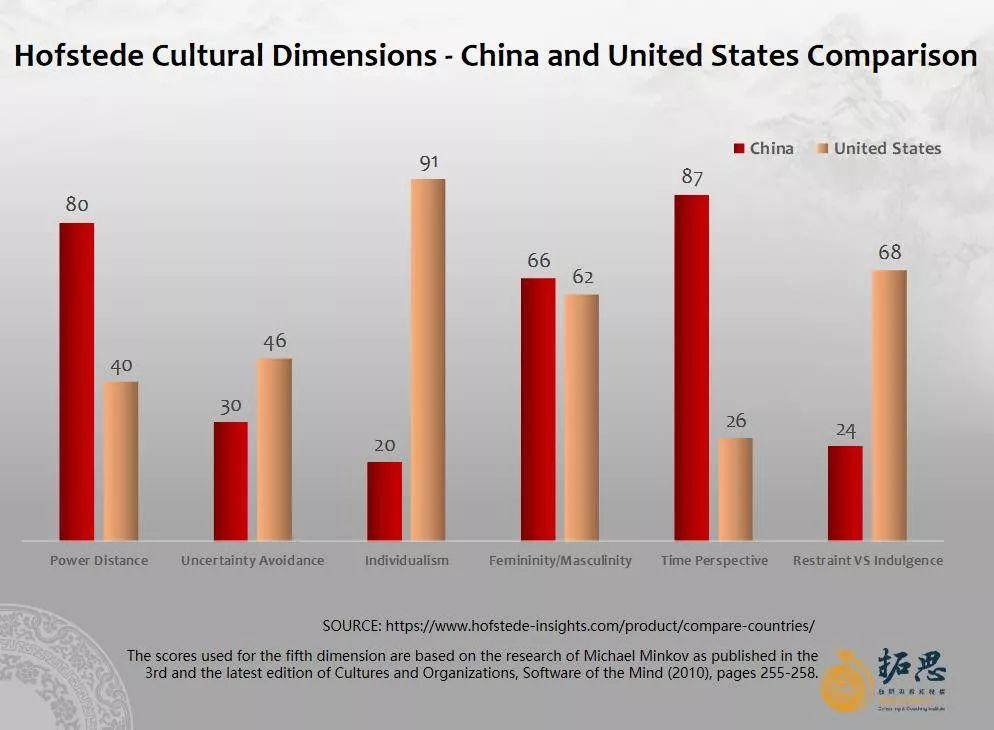
Why is there such disruption? Let’s take a look at PEST
,
Rapid Changes of PEST in China cultivate the soil for the growth of Coaching
Since President Xi has been on board in early 2013, the determination to crack down on corruption was so strong, reporting that one corrupt official was caught daily in the first 18 months under the new rule and through TV series, social media to educate the public the anti-corruption spirit. The new way of doing business by being competent, professional, and ethical replaces relationship and money. Lots of people need to learn to relearn to adapt to the new way and enhance their competence and professionalism. With the current conflicts between USA and China in trade affairs, it creates unstable atmosphere in Mainland China and entrepreneurs, senior executives in the organizations needs to be agile to deal with the situation and adapt to the environment and be innovative to find the new ways of survival.
In the past 30 years of fast economic development under the open market policy, China’s GDP has since slowed down from 2010 that prompted the need for internal restructure. The internet world opens another door to the people in China, changing their way of living, over 35.3% of China’s retail sales occur online, by far the highest rate in the world. The growth of the online ecosystem accelerated the speed of living and speed up the impact of globalization. Previously Mainland China was known as the “World Factory” and the manufacturing is still our main driver of GDP in China but facing the increasing cost in all aspects, digital factory with high automation is the trend to reach “Manufacturing 4.0”.
Nevertheless, it brought big improvements in the standard of living for the population. Thus, more and more luxurious branding restaurants have opened up in Shanghai. In the past, they would only open their restaurants in Hong Kong, using HK as the testing or stepping stone to the market in Mainland China but now, they go straight to Shanghai, the main city of Mainland China, a city overtaking China Hong Kong now in terms of economic and consumption abilities.
Along with the fast economic development and the one child policy since late 1970s, the young generation can enjoy all resources from the parents and old generation. The education level of people has significant increased. Thus, the population has become knowledgeable talents. With lots of chances to experience different cultures via travelling or internet, they have become a mixture of West and East, more self-centred or individualistic. People demand more in quality of life, not just materialistic but also on the spiritual level, more interest to search for personal growth and inner self-happiness. The young generation like people born in 80/90/00, late thirties, early thirties, early twenties are looking for the meaning of the life, the meaning of the job and career. However, the older generation is shaped by the Cultural Revolution who were born in 60’s and 70’s. They are not well educated but very hard working to rise above poverty. They are more family-oriented with collective in mindset. Thus, in China, one country has two generations now, creating many social and corporate issues in communication and conflicts. Seen in terms of Maslow’s Hierarchy of Needs, the triangle of the old and new generation is different. For the young generation they strive for self-actualization in their early 20, from the first job of the life whereas the old generation want to take care of physiological needs first. When looking for a job, the new generation asks, “What I can gain from the company?” first before they would concern about “What I can contribute to the company?” Their mindset turns the old generation’s upside down. The old generation thinks “What I can contribute?” first and then ask for “What I can gain?”
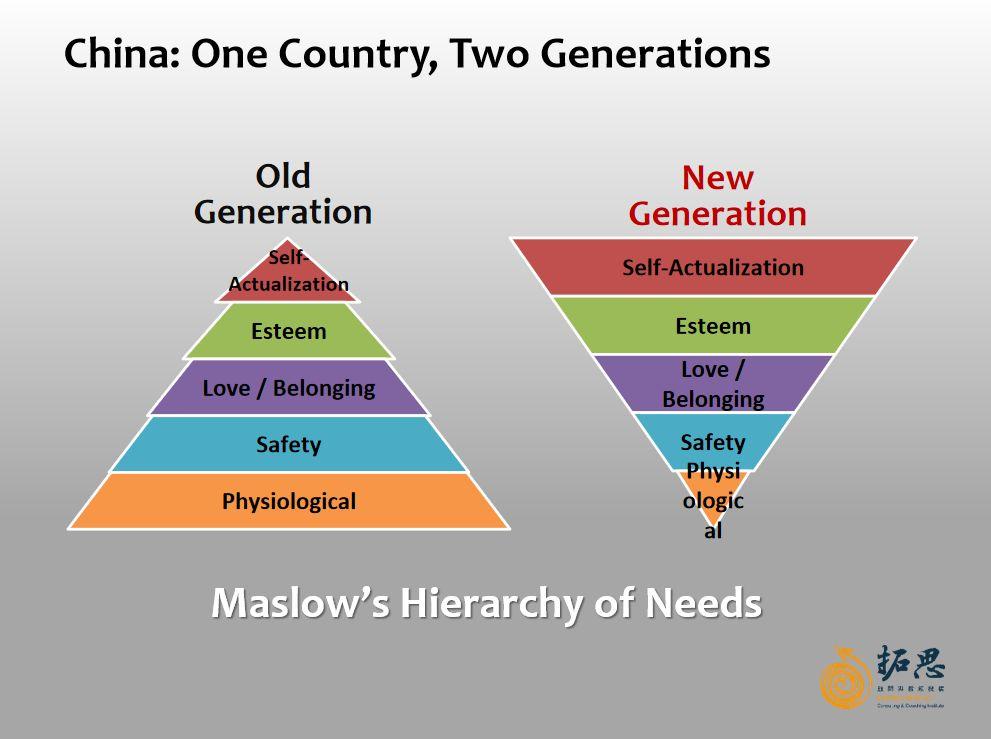
The aging population in China in the coming 20-30 years has not just created the social welfare issues but also the push for high technology and the application of AI in all aspects, services and manufacturing. The war of 5G between USA and China has demonstrated the effort of the enterprises in Mainland China for fighting for the technological innovation. The book written by Lee Kai Fu, published in Sept 2018, the famous AI promotor as well as entrepreneur from Taiwan but active in Mainland China states that the U.S. is still way ahead in the core technologies from research labs and universities. But China is now taking the lead in implementation and creating value by using AI in all kinds of applications and industries.” McKinsey Global Institute projected in 2018 that in China 1. 05 billion of the population will face some form of job changes in 2030.
Facing the slow-down of economic growth and fast growth of AI, people in China are learning how to adapt themselves to accept that it is not easy to earn quick money as in the past. They are worried if their personal growth can catch up with the growth of the world. They have very high eagerness to learn knowledge through all means, no matter online or offline, local or overseas to ensure they are on the fast track to grow continuously.
China is a place with tremendous, non-stop changes, full of VUCA: What are the impacts on the people? Confusion, Anxiety, Fear and Stress are their common emotions. They ask themselves: How will I be able to support my family? How do I make career progress in the changing environment? How will I be able to compete in the workplace? Even deeper question is What is the meaning of Life? If they are not able to handle themselves well, they would suffer from psychological and physiological problems.
The changing environment in all aspects in China create lots of coaching issues in communication, conflict and emotional management. Coaches help people find answers to these three key concerns: How to face changes that are uncertain? How to make effective choices? How to walk my talk?
Exercise 2:
Find a partner to share if your own country has similar situation as in China, changing in all factors at the same time and full of anxiety of the future and knowledge and discuss how coaching can help in such scenario. 5 minutes for sharing.
Who wants to share what you heard? (3 persons)
Coaching leadership, coaching skills, and coaching competences are from the West. I received a Western education in Hong Kong, but I am a Chinese loving Chinese languages and literature, loving coaching with strong passion. When starting to promote coaching in Mainland China since 1997, 22 years ago, to gain the trust from the Chinese who were eager to learn from the West but with closed mindset. I find three key quotes in Confucianism that are in alignment with Coaching.
1. In the Spring & Autumn period, the philosopher, Zeng Zi proposes “Every day I examine myself on three counts. It is the same idea in Coaching’s advocating that people need to enhance their self-awareness through series of coaching dialogues.
2. In the Tang Dynasty, the Emperor, Li Shi Min states that “With people as Mirror, one can know one’s right or wrong”. It is interesting that we always use “Coach as Mirror” this metaphor to explain what is coaching. Why is it a good match?
3. In the Ming Dynasty, the philosopher, Wang Yang Ming reminded people to “walk your talk”. It means we need to live out what we say in ethical basis. Coaches coach people to well behave and contribute to the community in a positive and ethical direction.
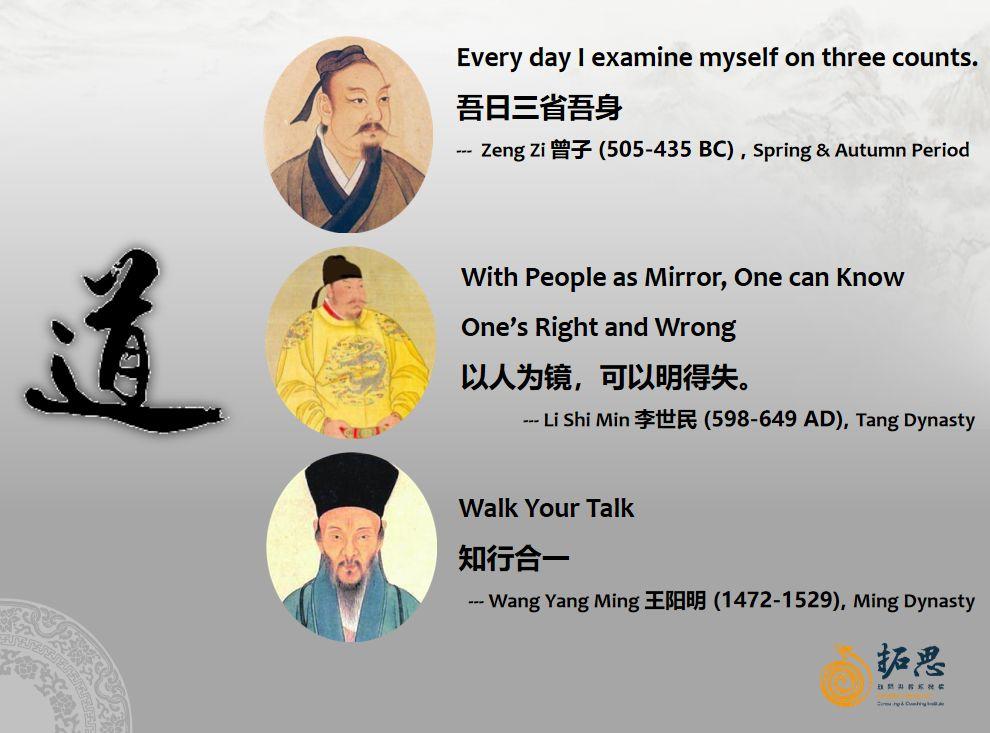
Thus, I love using those quotes of Confucianism to promote coaching in China and have received great acceptance which made our journey in China easier and with respect. This helps me a lot in handling the cultural shock and conflicts or questions about the effectiveness of Coaching to the organizations as well as the public.
To me, coaching is about revealing the potential, lowering the interferences of people from their inner self and growing self-awareness about purpose and being, integrated with the skills and competences to reach our dream. I always use this figure to elaborate the meaning of coaching through this Chinese character of Human being. I adopt Buddhism philosophy about “Wu Chang” which means “impermanence”, accepting “life is full of uncertainty” to coach my clients as well as match with our low score in “uncertainty avoidance” in Hofstede’s cultural dimension model. Besides the acceptance, how to face up the “impermanence”, I use Confucianism philosophy “Zhong Zheng”, including the meaning of “Neutral”, “Focus on one thing” and “stop all unrelated desires” as the coaching directions.
At the same time, we face the “relatively strong” resistance to accept coaching in the organizations in Mainland China even through more and more corporates are aware the importance of coaching in employment development and acknowledge the authentic feedback, the crucial coaching competence is the effective ability to let the employees understand the gap between the goal and the reality, that is highly fit for the changing working context with the requirement of agility and adaptability in China now. However, in Chinese traditional culture, people care too much about being moderate in relationship and face. Peaceful relationship and concern of personal face and others’ face hinder the authentic communication and the application of coaching leadership.
How to make use of Chinese Culture to promote coaching and become the coaching culture in the organisations in Mainland China while facing the resistance aroused from Chinese culture is not easy. It is a long, patient journey, requiring a systematic, tailor-made approach.
The introduction of CCCC
I have brought coaching leadership to the corporates in Mainland China since 1997 to now. From providing coaching workshops and executive coaching to the corporates to helping the corporate clients to build the coaching culture that means everyone in the organizations use coaching mindset and languages in formal and informal context to face the changing situations with high self-awareness and self-management, I have developed my own systematic approach to work with the corporates who have strong commitment and vision in employee development and organizational development via coaching culture.
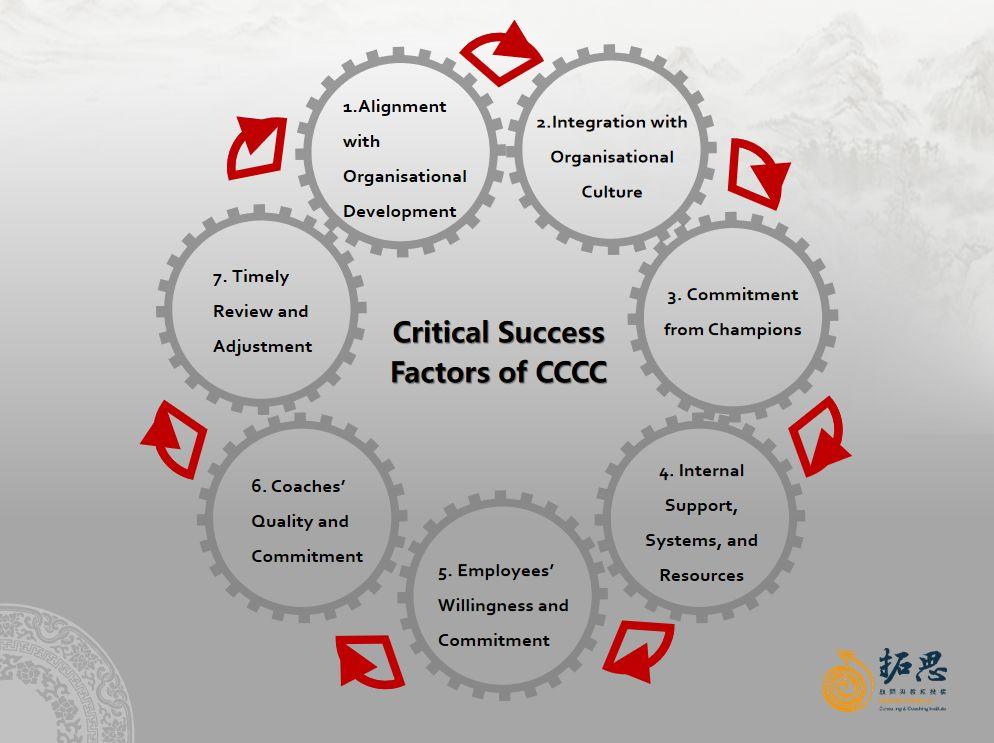
The approach consists of four elements:
1. Strategic Analysis of the corporate
2. Satisfaction of Critical Successful Factors
3. 10 implementation steps by the coaching consultancy
4. 9 implementation steps by the corporate client
Incorporating the original coaching steps and competences with Ying Yan designed by me, the CCCC is well accepted by organizations who agree to the Chinese wisdom: “It takes ten years to grow trees but a hundred years to rear people.” It is a long-term investment, not a short-term one, disrupting the current cultural dimensions in time perspective. Our vison for CCCC is to help the people in the organisations to make choices based on kindness. One of the largest internet company in Shenzhen, in the Southern part of China, Tencent, recently has updated their vision as “Technology for Social Good”. This is quite unlike some technology companies who are too open to do anything they like, against the Social Good.
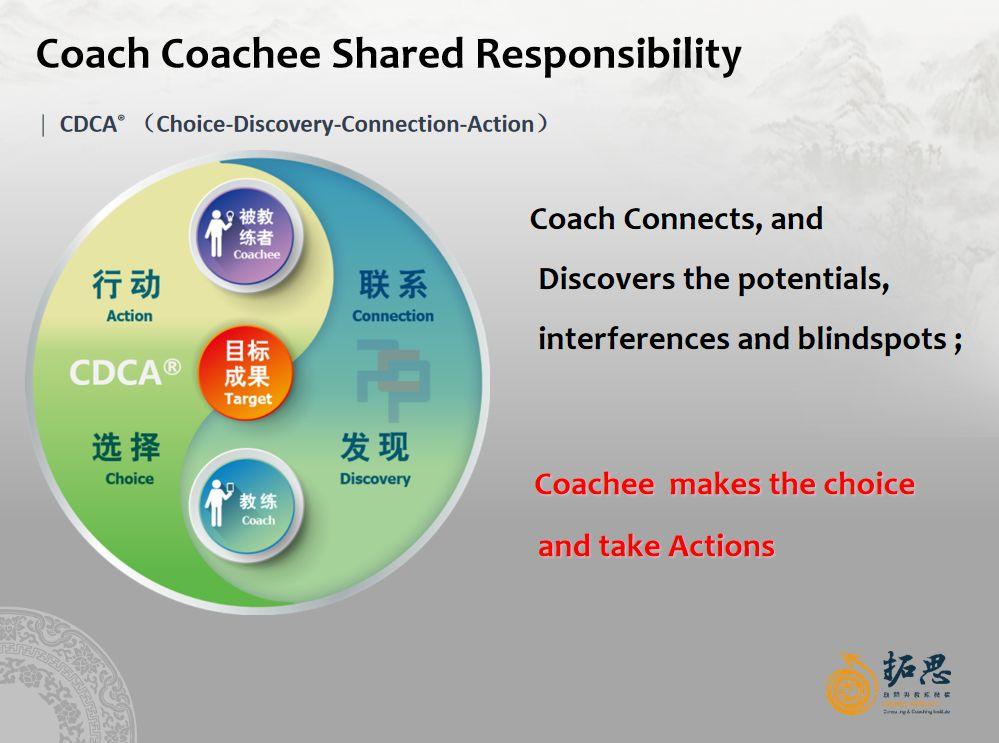
I propose that during this VUCA time, we need to use another VUCA to face up – Vision, Union, Curiosity and Adaptation. I hope we can help people in the organizations to face up to the disruption of Chinese culture, sustain good sides of Chinese culture like long-term commitment, humbleness, and kindness through coaching leadership and culture. Coaching can help people to clean up for self-awareness, wake up to their dream, grow up through actions and show up with results.
Every one can be a coach.
Every one needs a coach.
Every coach needs a coach.
Appreciate for the supporting of the coach team
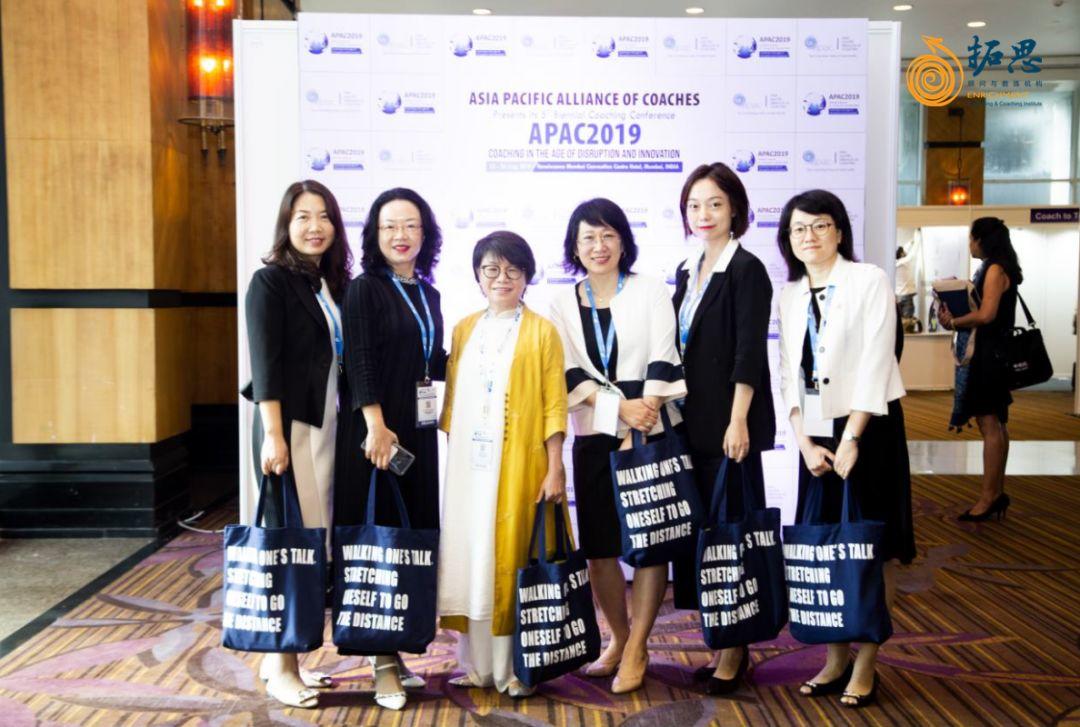
Rita OU YANG, Hellen OU YANG, Catherine Ng ,Angnes Zhang, Wengie Zhuang, Frances Yao
APAC Wonderful moment
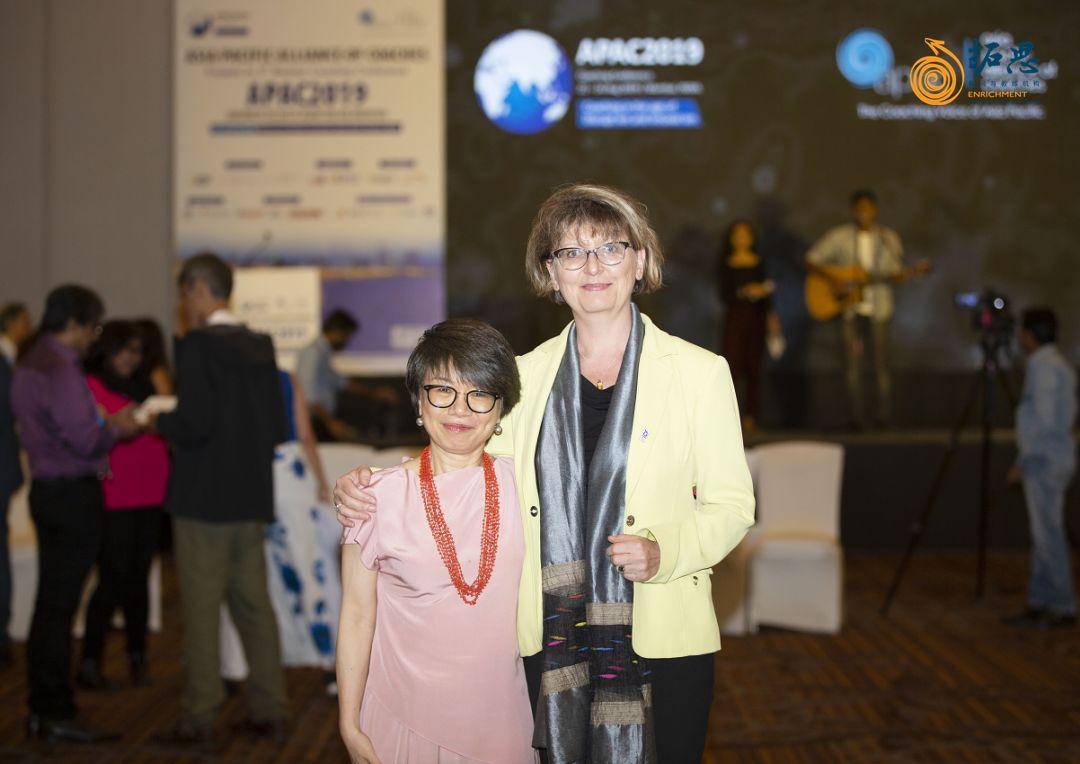
Catherine Ng and Magdalena Nowicka Mook(CEO and Executive Director-ICF)

Catherine Ng and David Goldsmith(Executive Director,7Paths Forward)
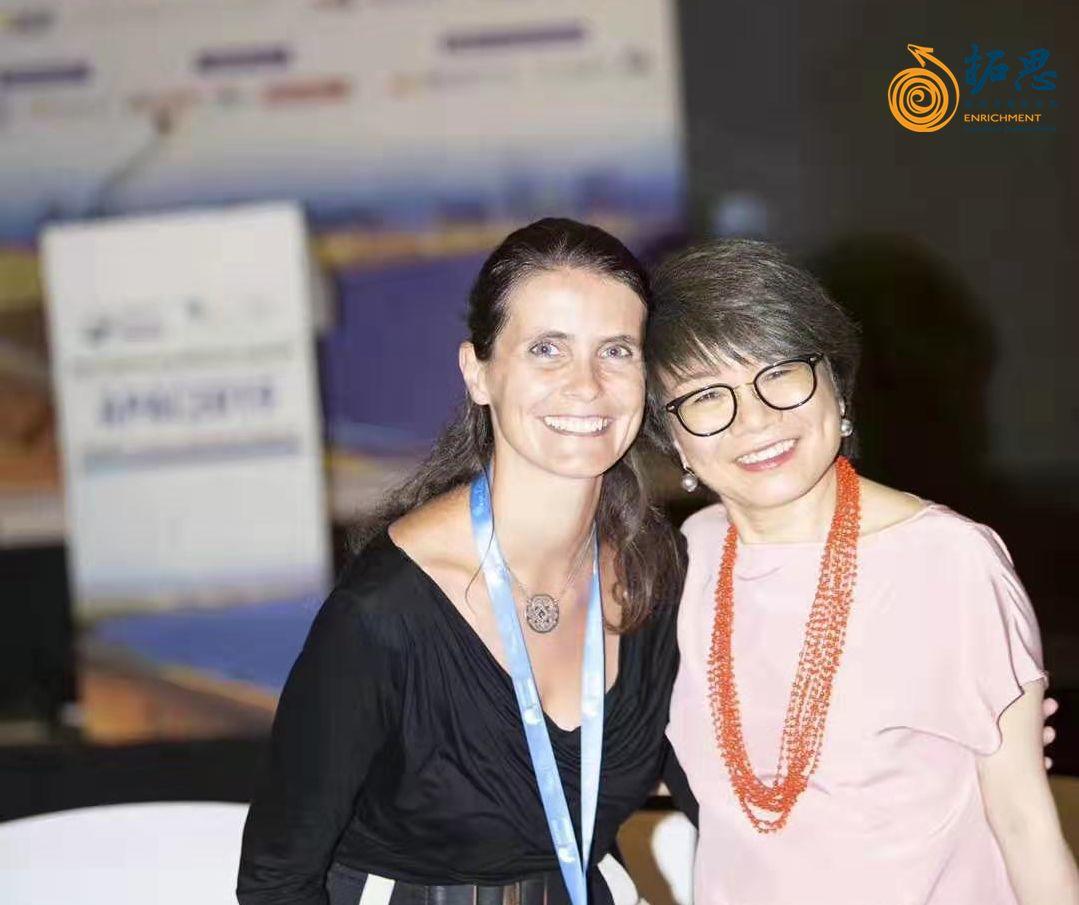
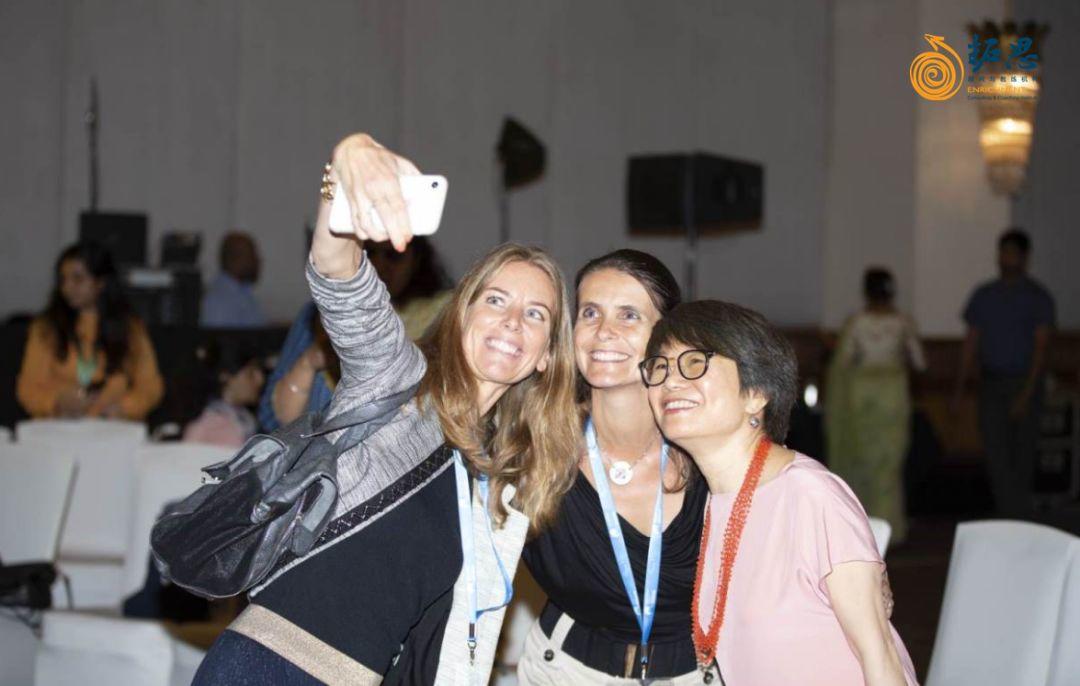
Catherine Ng and Mathilde
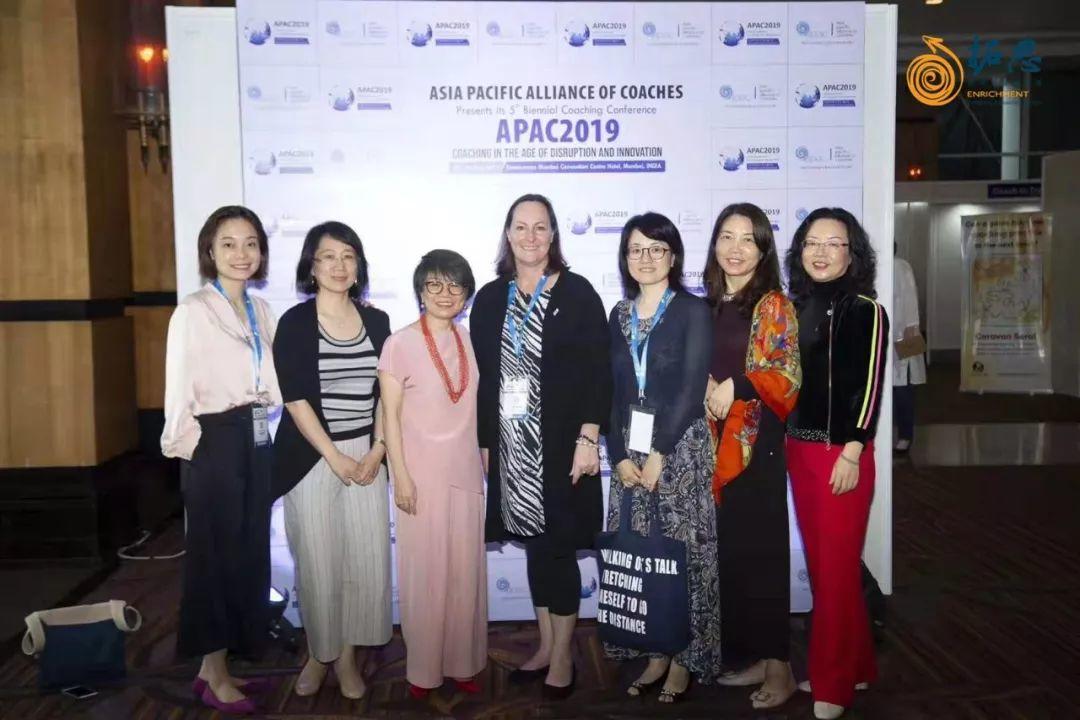
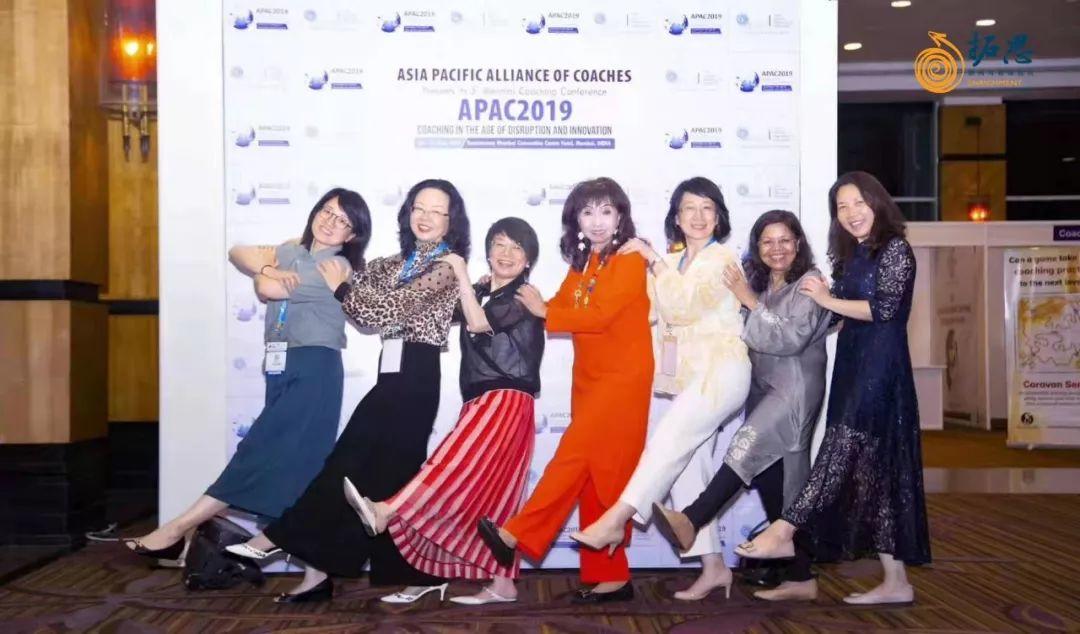
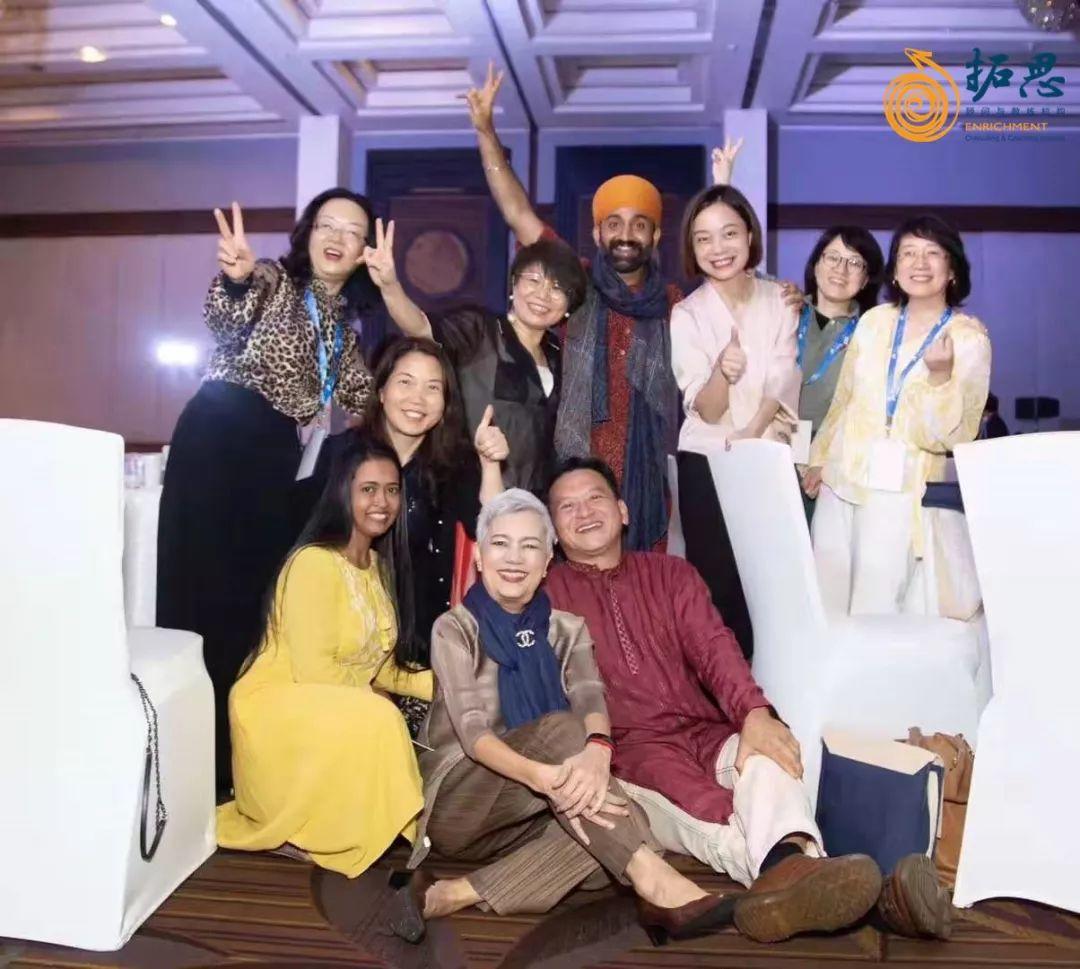
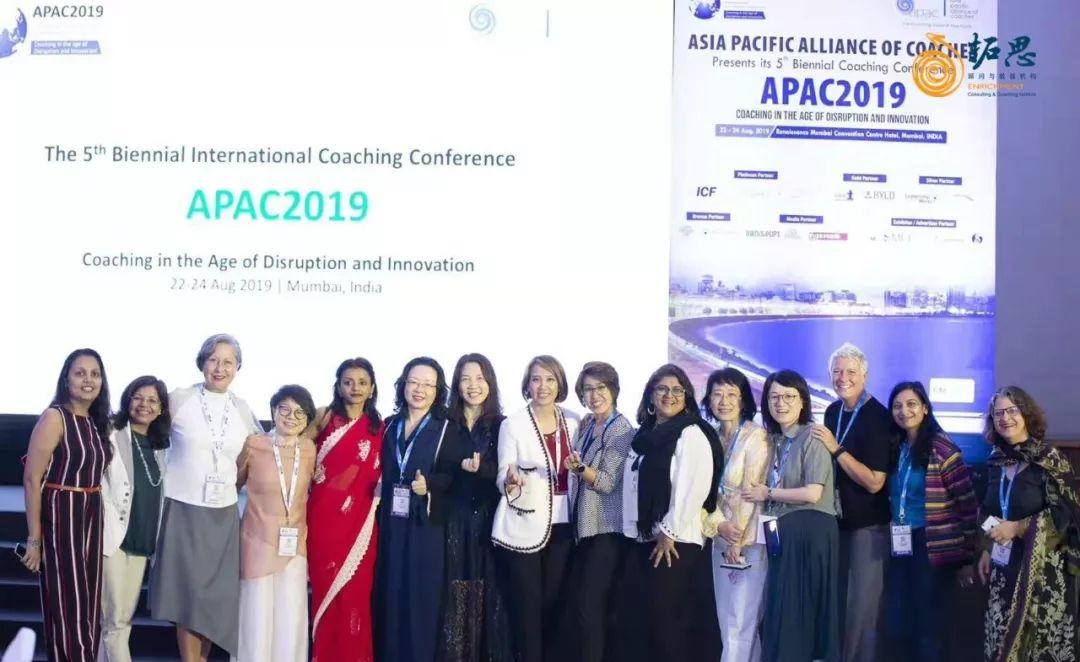
Other wonderful moments
Introduction to Catherine NG
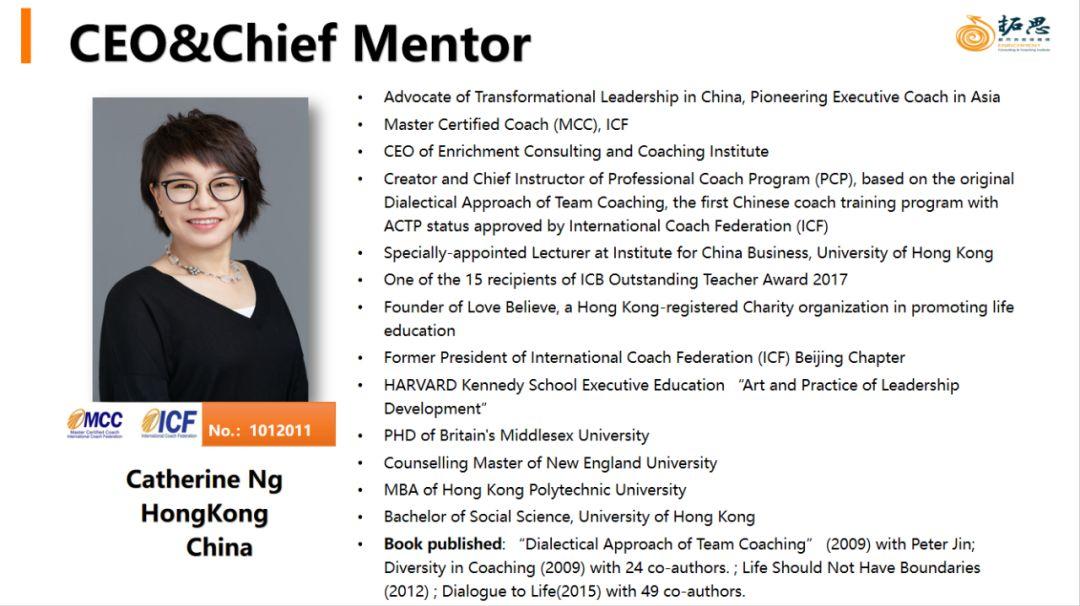
【Publications of Catherine NG】
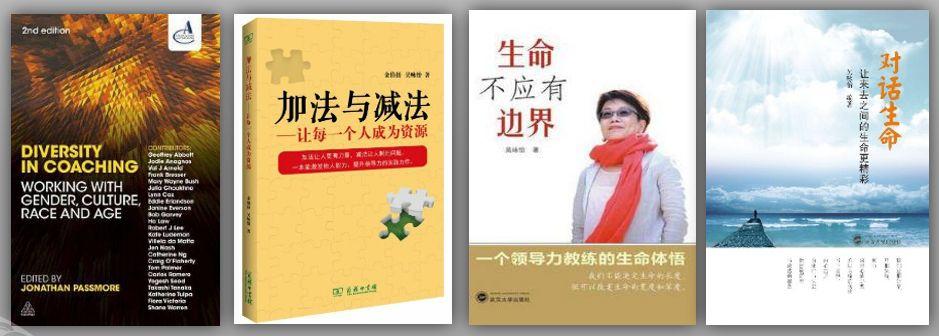
Thanks for reading
本篇文章来源于微信公众号: 吴咏怡企业教练

